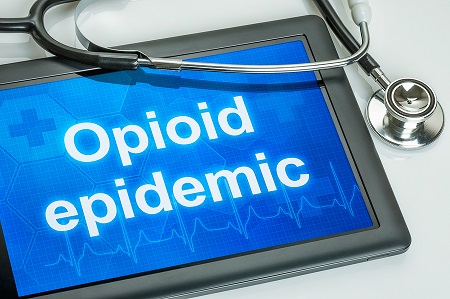 There are many unanswered questions regarding the opioid crisis currently gripping the United States and Canada, including what to do about pregnant woman addicted to the drug both in terms of the health and safety of the woman and the infant.
There are many unanswered questions regarding the opioid crisis currently gripping the United States and Canada, including what to do about pregnant woman addicted to the drug both in terms of the health and safety of the woman and the infant.
Up to a third of pregnant women are prescribed opioids for pain. Even though the U.S. Preventive Services Task Force recommends universal perinatal depression screening for all pregnant women, health care providers are ill-equipped to deal with screening for a dual diagnosis of a mental health condition and substance use.
Opioid use among pregnant women is increasing and pregnant women addicted to opioids have a higher prevalence of mental illness. In a recent study published in the Journal of Maternal and Child Health, researchers found that new mothers who were addicted to opioids while pregnant were at a higher risk of developing mental health conditions such as depression regardless of whether their infant developed neonatal abstinence syndrome (NAS) or not following labor. NAS can cause preterm birth, low birth weight, respiratory, gastrointestinal and central nervous system disturbances and infants are at an increased risk of maltreatment and foster care admission.
The rate of NAS tripled from 2000 to 2009 and the rate of neonatal intensive care admissions increased four-fold from 2004 to 2013. From over 15,000 mother-infant dyads studied, researchers found that mothers of infants with NAS had 2.5 times the risk of depression and 6.3 times the risk of schizophrenia.
Opioids come in different forms, both illicit and licit. Women who take opioids in the form of the illicit drug heroin and fentanyl can result in withdrawal symptoms in nearly 100% of infants. Women who take opioids in the form of legally prescribed methadone, buprenorphine or other prescription opioids can result in withdrawal symptoms in infants three to five days post-labor and withdrawal symptoms sometimes don’t occur at all but mothers are still at an increased risk of developing a mental illness regardless. It is not known why some infants develop NAS and others don’t and researchers express the concern that mothers on opioids whose infants don’t develop NAS may not receive the “wrap-around” mental health support that families affected by NAS normally do.
In Canada, 30 per cent of pregnancies are affected by opioid use in northwestern Ontario alone where the epidemic was first recognized there over 10 years ago. A state of emergency regarding abuse of prescription drugs was declared by the Nishnawbe Aski Nation Chiefs-in-Assembly in 2009. Nationwide, across Canada, opioid hospital admissions increased from nine per day in 2007-08 to more than 13 per day in 2014-15.
A guideline released this month developed by the Canadian Research Initiative in Substance Misuse states that pregnant women addicted to opioids be given methadone or buprenorphine while pregnant instead of withdrawal management because of the high rates of relapse and adverse outcomes associated with rapid withdrawal including preterm labor and even fetal death. Unfortunately, methadone and buprenorphine are not widely available in rural and remote communities such as northwestern Ontario and pregnant women must travel to maternity centers for care.
Back in the U.S., Ohio is known as “ground zero” for the opioid epidemic where 2531 residents died of overdoses in 2014 and 3050 in 2015. Children are being taken from their parents because of opioid addiction. There was an 11 per cent increase in children in care between 2010 and 2016 because of parental drug addiction. Seventy per cent of infants aged one or younger in child care have parents with drug disorders involving opioid or cocaine.
Nationally, NAS affects 5.8 out of every 1000 hospital births in the U.S. According to a recent study in the Journal of Child Abuse and Neglect, pregnant women addicted to opioids avoid seeking help because they are afraid they will lose custody of their children. According to Nancy D. Campbell, a professor of science and technology studies at Rensselaer Polytechnic Institute in New York, in an article published in the AMA Journal of Ethics this month, she writes that women who use opioids continue to be threatened with punishment rather than supportive treatment.
“Moms are part of the cure,” writes Campbell, “and compassionate care demands that surveillance be judiciously used in therapeutic spaces.”
REFERENCES:
Nancy D. Campbell, (March 2018), AMA Journal of Ethics, When Should Screening and Surveillance Be Used During Pregnancy?, https://www.ncbi.nlm.nih.gov/pubmed/29542439
Laura J. Faherty, Meredith Matone, Molly Passarella, Scott Lorch, (February 2018), Journal of Maternal and Child Health, Mental Health of Mothers of Infants with Neonatal Abstinence Syndrome and Prenatal Opioid Exposure, https://www.ncbi.nlm.nih.gov/pubmed/29417369
Julie Bruneau, Keith Ahamad, Marie-Ève Goyer, Ginette Poulin, Peter Selby, Benedikt Fischer, T. Cameron Wild and Evan Wood, Canadian Medical Association Journal, (March 2018), Management of opioid use disorders: a national clinical practice guideline, http://www.cmaj.ca/content/190/9/E247
Jumah NA, Bishop L, Franklyn M, Gordon J, Kelly L, Mamakwa S, O'Driscoll T, Olibris B, Olsen C, Paavola N, Pilatzke S, Small B, Kahan M., (2017), Canadian Journal of Public Health, Opioid use in pregnancy and parenting: An Indigenous-based, collaborative framework for Northwestern Ontario, https://www.ncbi.nlm.nih.gov/pubmed/29356671
Falletta L, Hamilton K, Fischbein R, Aultman J, Kinney B, Kenne D., (January 2018), Perceptions of child protective services among pregnant or recently pregnant, opioid-using women in substance abuse treatment, https://www.ncbi.nlm.nih.gov/pubmed/29433069
Patricia Tomasi is a mom, maternal mental health advocate, journalist, and speaker. She writes regularly for the Huffington Post Canada, focusing primarily on maternal mental health after suffering from severe postpartum anxiety twice. You can find her Huffington Post biography here. Patricia is also a Patient Expert Advisor for the North American-based, Maternal Mental Health Research Collective and is the founder of the online peer support group - Facebook Postpartum Depression & Anxiety Support Group - with over 1500 members worldwide. Blog: www.patriciatomasiblog.wordpress.com
Email: tomasi.patricia@gmail.com